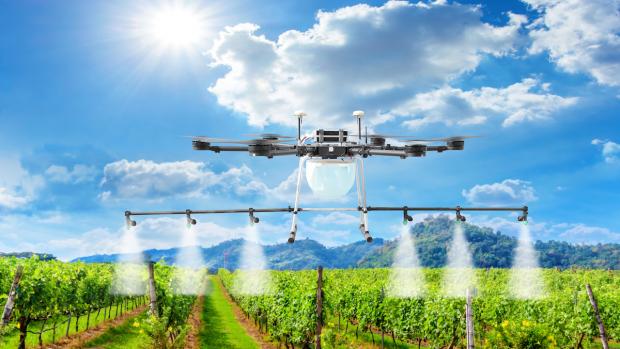NYU Tandon startup paves the way for pesticide-free cannabis, wine grapes, and other high-value crops
Brooklyn Bioscience, born in university lab, develops engineered enzyme for a safe, low-cost method of detoxifying organophosphates

The startup company Brooklyn Bioscience is commercializing engineered proteins from the laboratory of Professor Jin Kim Montclare to detoxify highly dangerous pesticides used on grapes, cannabis, and tea.
BROOKLYN, New York, Tuesday, August 20, 2019 – Brooklyn Bioscience, a startup company commercializing university research to detoxify a common and dangerous class of pesticides, recently received another round of funding — this time in the form of a $250,000 grant from the National Science Foundation.
The New York University School of Engineering team behind Brooklyn Bioscience is engineering proteins to remediate and detoxify organophosphates (OPs), which cannot easily be removed by conventional means.
The two-year grant, part of the NSF’s Partnership for Innovation program, was awarded to the startup whose principals include Jin Kim Montclare, a professor of chemical and biomolecular engineering at the NYU Tandon School of Engineering and doctoral candidate Andrew Olsen.
OPs currently represent approximately more than a third of the chemical pesticides used globally, and while they provide a means for efficient crop production, they also pose grave public health and environmental risks; because of their hydrophobic nature, OPs cannot readily be washed away or removed by other conventional methods. The World Health Organization has named OPs, which are classified as neurotoxins, as one of the most hazardous classes of chemicals being used in the agricultural sector, and the societal and environmental impacts of OP contamination have been estimated at $12 billion annually.
Using protein engineering methods, Montclare and her team members have altered the enzyme phosphotriesterase (PTE), incorporating fluorinated non-natural amino acids, increasing its stability, and employing computational design to develop a more stable and functional version with increased half-life. Their engineered PTE provides a low-cost, efficient, and environmentally friendly solution for breaking down dangerous OPs into relatively benign products that can be more easily removed with water. (The PTE, in the form of a crystalline powder, is added to water by the user and applied as necessary.)
The product is of particular interest to cannabis farmers, because OPs, when vaporized and inhaled, are exponentially more toxic than when ingested by mouth; in states such as California and Colorado, which are introducing strict regulations governing the cultivation of cannabis, a much lower level of OPs is allowed than that considered acceptable in fruits and vegetables.
With the domestic wine industry now worth more than $20 billion annually — and with enzymes already ubiquitous to the wine-making process — Brooklyn Bioscience also counts vintners among its early adopters; because the technology removes pesticides from the surface of the grape before the fermentation process, flavor, color, clarity, and aroma are not adversely affected. Tea farmers, as well, have expressed interest, since the prevalence of excessive OPs has negatively impacted the $46 billion global tea market in recent years, particularly in the highly lucrative green tea sector.
“Agricultural analysts have calculated that the pesticide segment of the market represents $17 billion, with more than a tenth of that corresponding directly to the sales of OPs,” Montclare explained. “Given the importance of sustainability and environmental health, it’s more vital than ever to develop biologically-based solutions for crop protection, and with the support available at NYU Tandon, Brooklyn Bioscience is making great strides.”
In recent years Brooklyn Bioscience also garnered a $50,000 award from PowerBridgeNY, a New York State Energy Research and Development Authority (NYSERDA)-sponsored proof-of-concept center aimed at leveraging innovations that originate in university research labs. It was a semifinalist in Tandon’s entrepreneurial InnoVention competition, as well.
Montclare, who directs Tandon’s Convergence of Innovation and Entrepreneurship Institute, is a member of the American Chemical Society, the International Society for Pharmaceutical Engineering, the Biophysical Society, the Materials Research Society, the Biochemical Society, the Protein Society, the American Association of Cancer Research, and the American Institute of Chemical Engineers. Her honors include the 2016 American Chemical Society Women Chemists Committee Rising Star Award; 2015 Agnes Fay Morgan Research Award from Iota Sigma Pi; 2014 Distinguished Award for Excellence, Dedication to Invention, Innovation and Entrepreneurship; 2014 Executive Leadership in Academic Technology and Engineering Fellowship; and membership in the National Honor Society for Women in Chemistry. She was recently inducted to the American Institute for Medical and Biological Engineering College of Fellows and is a 2019 American Association for the Advancement of Science Leshner Fellow.
Note: Images available at https://nyutandon.photoshelter.com/galleries/C0000DKT3j1lAvpA/G0000oaZna_hgv5w/Brooklyn-Bioscience
About the New York University Tandon School of Engineering
The NYU Tandon School of Engineering dates to 1854, the founding date for both the New York University School of Civil Engineering and Architecture and the Brooklyn Collegiate and Polytechnic Institute (widely known as Brooklyn Poly). A January 2014 merger created a comprehensive school of education and research in engineering and applied sciences, rooted in a tradition of invention and entrepreneurship and dedicated to furthering technology in service to society. In addition to its main location in Brooklyn, NYU Tandon collaborates with other schools within NYU, one of the country’s foremost private research universities, and is closely connected to engineering programs at NYU Abu Dhabi and NYU Shanghai. It operates Future Labs focused on start-up businesses in downtown Manhattan and Brooklyn and an award-winning online graduate program. For more information, visit http://engineering.nyu.edu.




